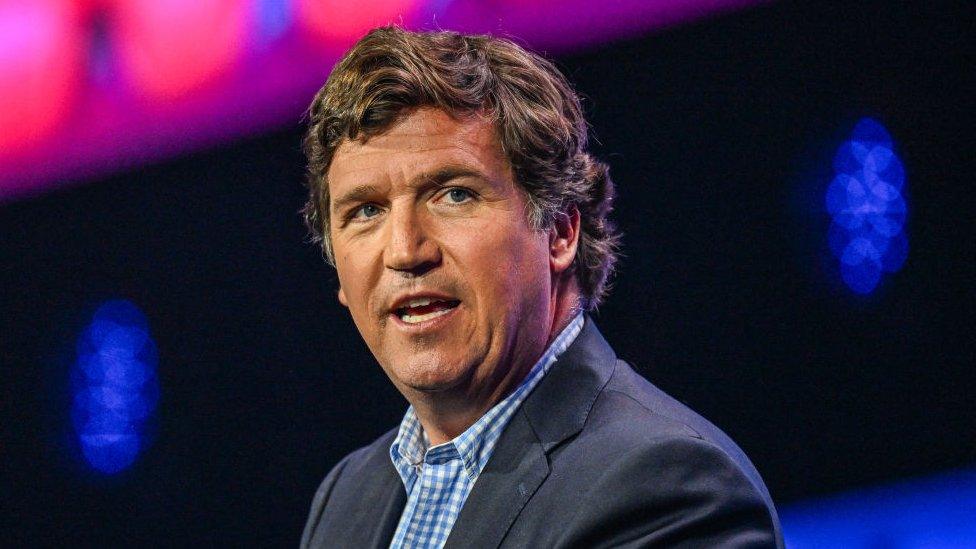Who is Tucker Carlson, the man interviewing Vladimir Putin?
- Published
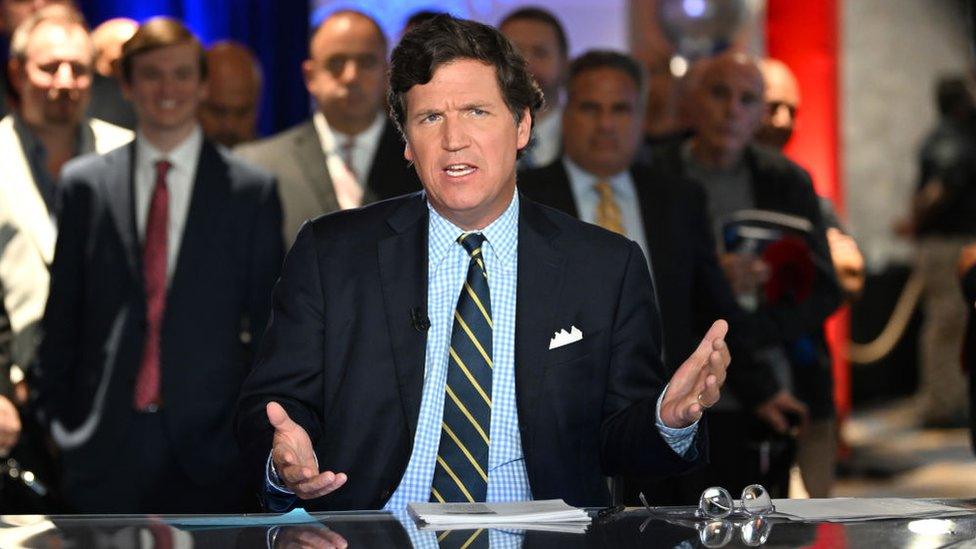
American journalist Tucker Carlson is the first Western journalist to interview Russian President Vladimir Putin since his country's invasion of Ukraine in February 2022. The televised sit-down will air on Thursday, bringing a fresh wave of attention to Mr Carlson, once one of the highest-rated hosts in US network news and now an industry outsider.

In April of last year, around 8pm on a Friday night, Tucker Carlson addressed his viewers.
During his nightly broadcast on Fox News, he had run through a number of segments, all with his signature right-wing bent.
He lambasted President Joe Biden's plans to address racial biases in housing, attacked Mr Biden's son, Hunter, and mocked a commonly used acronym for gay, lesbian and transgender people.
At the end, he gave a cheery sign-off.
"We'll be back on Monday," he said. "In the meantime, have the best weekend with the ones that you love, and we'll see you then."
But Mr Carlson never returned.
That next Monday, the Rupert Murdoch-controlled Fox announced the network and its most popular personality had agreed to "part ways". Tucker Carlson Tonight was no longer.
For six years, the hour-long prime-time programme had ruled the conservative airways, consistently drawing about three million viewers each evening.
And for Mr Carlson, now 54, the show had marked the peak of a career decades in the making.
The Californian - son of an artist and a roving journalist - had first entered the media world in the 1990s, writing for several prominent publications, including New York Magazine, Esquire and The New Republic.
In 2010, with his former university roommate Neil Patel, he founded the conservative news website The Daily Caller, seen as an alternative to left-leaning websites like Huffington Post. The site promised to emphasise original reporting over punditry, but was criticised for publishing unproven allegations against Democratic politicians and promoting racist and sexist stereotypes.
Mr Carlson cut ties with the site in 2020.
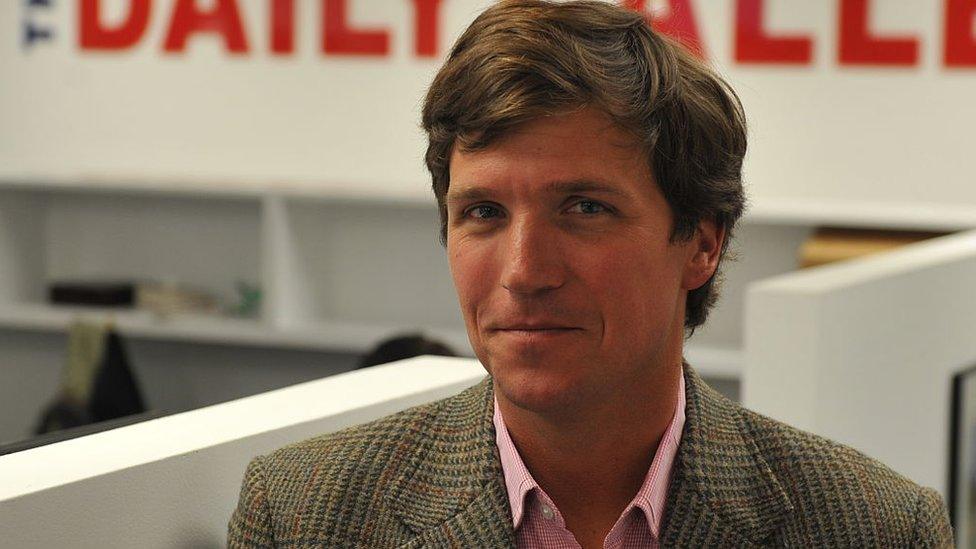
Mr Carlson pictured in the office of the Daily Caller, the conservative site he launched in 2010
As he grew his influence online, Mr Carlson also made a foray into broadcast. He worked as a commentator for CNN in the early 2000s before joining MSNBC to host a nightly programme.
It was here that Mr Carlson sharpened his conservative stances, growing increasingly critical of immigration - which he sometimes called an "invasion" - and becoming a voice for the Republican party's nativist wing.
After moving to Fox in 2009, Mr Carlson bounced around the network's minor leagues, including a 2013 stint as weekend co-host of its morning show, where he once fell asleep on air, external.
By 2016, he was ready for prime-time, launching Tucker Carlson Tonight just a few days after Donald Trump was elected president.
The debut episode attracted nearly four million viewers. But the host caught an even bigger break the next year, when Fox News fired Bill O'Reilly, its most popular host at the time.
Now there was an opening for the next network star, and Mr Carlson promptly took it.
With Mr Trump in the White House, he rode the wave of populist outrage that fuelled the Republican's political victory. His popularity ballooned, and his programme frequently set the agenda for conservatives and, by extension, the Republican party.
As he became appointment viewing for the political right, Mr Carlson also drew fire from fact-checkers and activists, who accused him of pushing racist and nationalist talking points, including the so-called "great replacement" conspiracy theory which claims a cabal of people is plotting to change the demographics of Western countries.
In one episode, he advocated for the US invasion of Canada. In another, he called the metric system the "yoke of tyranny".
And on several occasions, he used his perch at Fox to defend Russia's President Putin.
His controversial statements did not go unnoticed by Fox, who saw several large companies pull advertisements in protest. But for the most part, the network left him to his own devices.
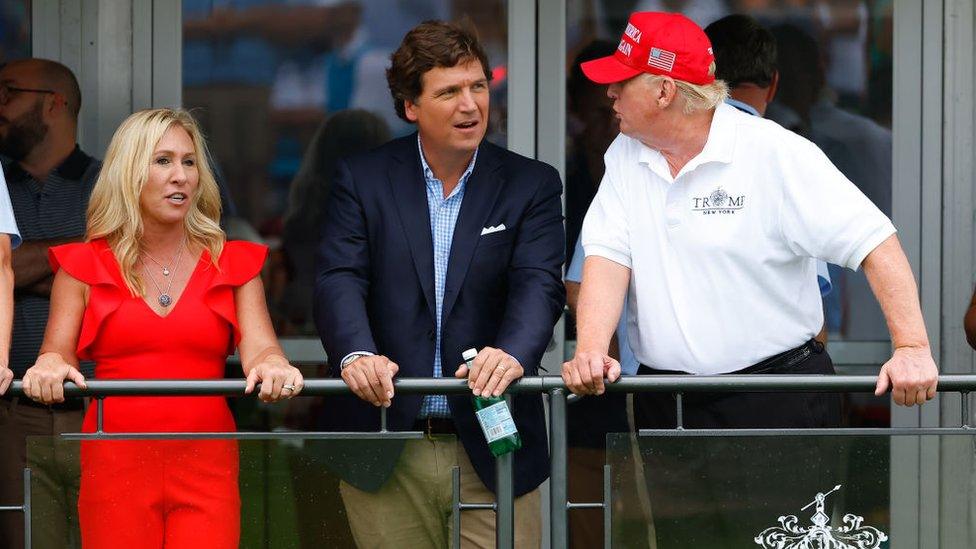
With Donald Trump in the White House, Mr Carlson's popularity ballooned
Then, in April of last year, Mr Carlson's run at Fox came to a sudden end.
The network gave no formal reason for his dismissal, but Mr Carlson's departure was just days after Fox News paid an extraordinary $787m (£633m) settlement to Dominion Voting Systems over false election claims. The lawsuit revealed, among other things, that Mr Carlson derided Mr Trump's election fraud claims in private messages while backing them publicly on the air.
After a few weeks of quiet, Mr Carlson announced he would begin a new show on social media platform X, formerly Twitter.
"Facts have been withheld on purpose along with proportion and perspective. You are being manipulated," he said in the announcement.
That December saw the birth of a paid streaming service, the Tucker Carlson Network, which Mr Carlson framed as free from corporate influence.
His content and guests have become increasingly fringe.
In July, he published a two-and-a-half hour interview with Andrew Tate, the British-American influencer accused in Romania of rape, human trafficking and forming an organised crime group to sexually exploit women.
He also posted a surprise Christmas Eve fireside chat with disgraced actor Kevin Spacey, as he reprised his role as House of Cards lead character, the fictional President Frank Underwood.
Largely, Mr Carlson has failed to re-create the popularity and attention he enjoyed at Fox. Mr Putin's appearance promises be a boon for him, and possibly a way for his star to rise again.
With reporting from Kayla Epstein & Madeline Halpert
Related topics
- Published8 February 2024
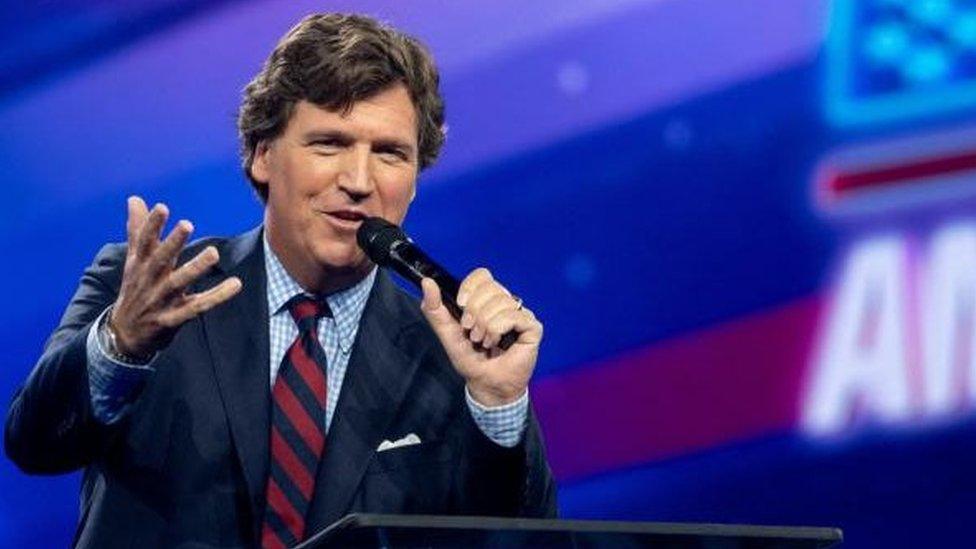
- Published25 April 2023
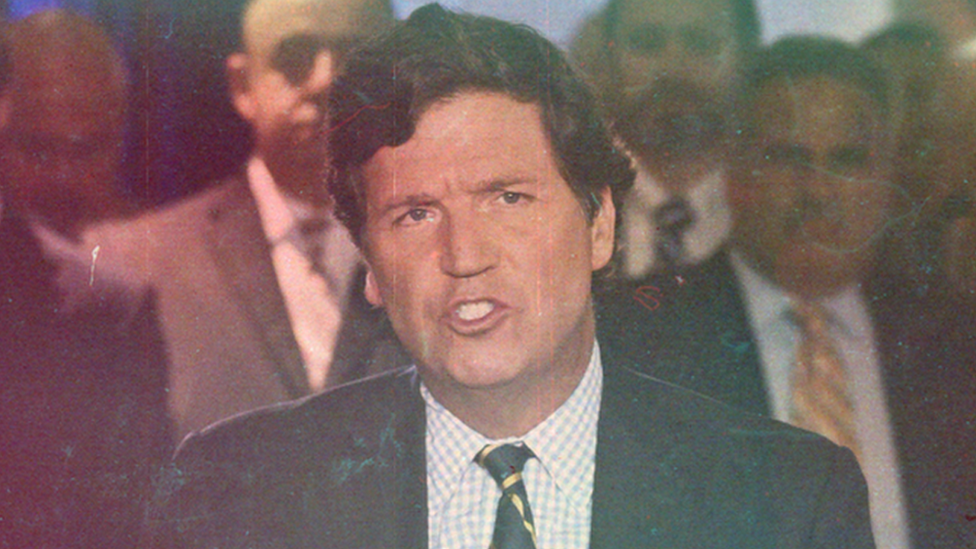
- Published6 February 2024
